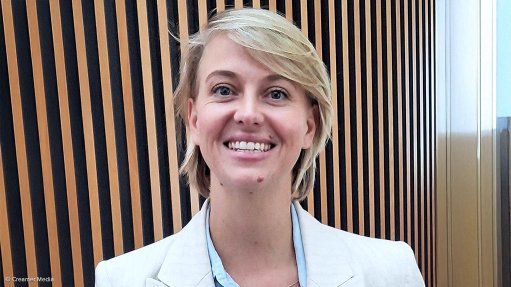Role models directly contribute to more women pursuing technical careers


NAADIYA MOOSAJEE Professional role models and having engineering work and careers explained in one's own language are immensely relevant to motive young women
Female engineering and technical careers social enterprise Women in Engineering (WomEng) says that its work supporting girls and young women to enter technical disciplines shows that female engineer and industrial scientist role models with backgrounds comparable to prospective girls and young women who can identify with them are a strong contributing factor in motivating potential candidates to pursue technical careers.
WomEng co-founder and civil engineer Naadiya Moosajee highlights that South Africa, and more broadly Africa, has a shortage of engineers and technical skills compared to more developed countries, as well as in relation to each country’s internal and regional developmental needs.
“On average, women constitute only about 10% of the people working in engineering and technology jobs, and inspiring more women to pursue these careers will reduce the deficit of skills in countries.
“Further, the digital future being shaped as the fourth industrial revolution (4IR) progresses can only be attained with sufficient technical skills. If a country does not have these skills, it will not be globally competitive. While the 4IR is broadly based on digital technologies, technical disciplines such as civil and mechanical engineering remain core to develop industries and infrastructure. Simultaneously, there is expected to be a global shortage of cybersecurity practitioners that can be ameliorated by encouraging more women to pursue technical careers.”
However, social pressures within communities and within companies remain barriers to more women entering and remaining within these careers. This is one of the reasons WomEng was founded. It is working in 22 countries around the world with the intention to support one-million girls and women to become engineers and technical specialists, notes Moosajee.
WomEng has more than 50 000 beneficiaries, and conducts programmes and roadshows for its members to engage with girls and young women. Significantly, the girls and young women are often inspired by the presenters. In the areas where Moosajee – a civil engineer – spoke to participants, there was a spike in applications for civil engineering by participants and, in the areas where her business partner – a chemical engineer – presented, there was a spike in applications for chemical engineering.
“Role models for girls and young women are very important: to see a professional woman demystifying engineering allows them to identify with her and understand that women can be engineers,” she says.
Social pressures and culture play a big role in shaping the potential career paths that girls and young women aspire to, and this is why programmes that have professionals engaging with youths is crucial to encourage and inspire them.
“The effect that role models have on young women is significant. Similarly, having someone explain engineering work and careers to you in your own language is also immensely relevant. Our members often present to young women in their own communities and societies; they know the languages and nuances of the cultures, as well as the types of pressures and challenges the youths face, and can use their own life stories as examples for how women can pursue engineering degrees.”
Moosajee notes the organisation’s work in Nigeria, Kenya, Malawi, and a range of countries, and highlights the work by black female engineers in South Africa inspiring youths mainly in township schools where the impact will be greatest.
“The outcomes of these engagement sessions are transformative for the participating girls and young women,” emphasises Moosajee.
WomEng was awarded $30 000 as part of the social media platform Facebook Community Accelerator Programme. This involves a six-month programme where community leaders will learn from experts and coaches and create a customised curriculum to grow their communities.
These funds will help the network of women and girls to continue to connect, educate and support more women and girls throughout the engineering pipeline.
Further, transformation of the industry, while a sensitive topic, involves all roleplayers, says Moosajee.
“Similar to the transformation of other sectors, it will strengthen the industry and ecosystem. Some of the greatest champions of transformation, including those who support WomEng’s work, are people in large and established engineering companies that actively support diversity in their global and local operations,” she details.
The United Nations’ Sustainable Development Goals will only be achieved with the participation of engineers, and there is a considerable need to have more engineers working on the significant but surmountable challenges facing countries.
Article Enquiry
Email Article
Save Article
Feedback
To advertise email advertising@creamermedia.co.za or click here
Press Office
Announcements
What's On
Subscribe to improve your user experience...
Option 1 (equivalent of R125 a month):
Receive a weekly copy of Creamer Media's Engineering News & Mining Weekly magazine
(print copy for those in South Africa and e-magazine for those outside of South Africa)
Receive daily email newsletters
Access to full search results
Access archive of magazine back copies
Access to Projects in Progress
Access to ONE Research Report of your choice in PDF format
Option 2 (equivalent of R375 a month):
All benefits from Option 1
PLUS
Access to Creamer Media's Research Channel Africa for ALL Research Reports, in PDF format, on various industrial and mining sectors
including Electricity; Water; Energy Transition; Hydrogen; Roads, Rail and Ports; Coal; Gold; Platinum; Battery Metals; etc.
Already a subscriber?
Forgotten your password?
Receive weekly copy of Creamer Media's Engineering News & Mining Weekly magazine (print copy for those in South Africa and e-magazine for those outside of South Africa)
➕
Recieve daily email newsletters
➕
Access to full search results
➕
Access archive of magazine back copies
➕
Access to Projects in Progress
➕
Access to ONE Research Report of your choice in PDF format
RESEARCH CHANNEL AFRICA
R4500 (equivalent of R375 a month)
SUBSCRIBEAll benefits from Option 1
➕
Access to Creamer Media's Research Channel Africa for ALL Research Reports on various industrial and mining sectors, in PDF format, including on:
Electricity
➕
Water
➕
Energy Transition
➕
Hydrogen
➕
Roads, Rail and Ports
➕
Coal
➕
Gold
➕
Platinum
➕
Battery Metals
➕
etc.
Receive all benefits from Option 1 or Option 2 delivered to numerous people at your company
➕
Multiple User names and Passwords for simultaneous log-ins
➕
Intranet integration access to all in your organisation

















